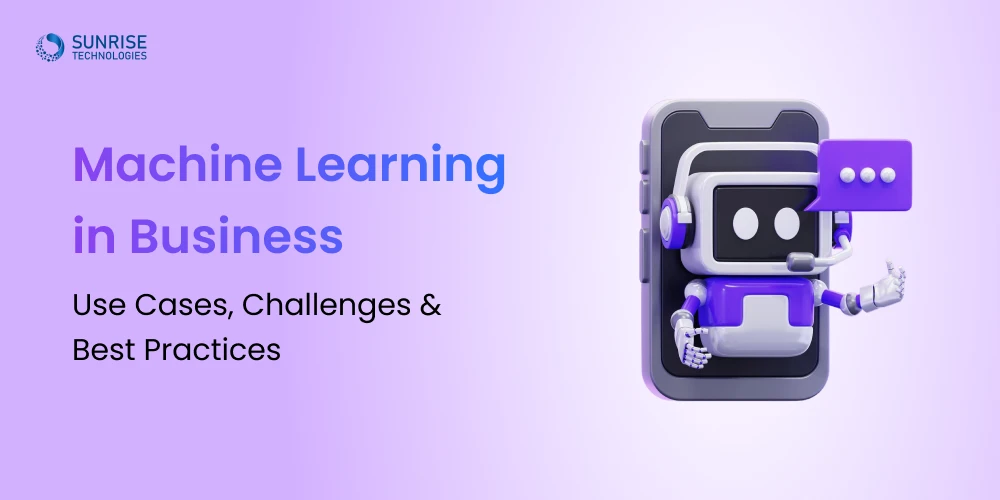
Machine Learning in Business Applications: Real-World Use Cases, Challenges, and Best Practices
Nov 17, 2025
Machine learning (ML) has moved far beyond academic research laboratories and consumer gadgets. Today, it sits at the core of decision-making for thousands of modern businesses—whether they operate in finance, logistics, retail, healthcare, or digital services. As companies generate massive amounts of structured and unstructured data, ML offers a way to turn those data streams into practical insights, predictions, and automated actions.
This article explores how machine learning is used inside real businesses, the most common challenges companies face, and practical best practices drawn from real-world implementation experience. The goal is to provide a grounded, technical perspective suitable for product teams, engineers, analysts, and business leaders navigating ML adoption. Sunrise Technologies also contributes research and implementation experience in this area, including work across supply-chain, compliance, and enterprise automation systems.
Why Machine Learning Matters for Modern Businesses?
Most organisations now operate on data. Customer interactions, transactions, sensor inputs, operational logs, and market signals generate a continuous stream of information. Machine learning helps businesses interpret this complexity by:
- Identifying patterns and anomalies
- Predicting future events with statistical confidence
- Automating routine decision-making
- Enhancing human judgement with data-driven recommendations
The result is improved efficiency, reduced operational risk, and measurable financial impact—often without increasing workforce size.
Key Real-World Business Use Cases of Machine Learning
Machine learning is now used across a wide range of business functions. Some of the most impactful applications include:
1. Fraud Detection and Risk Scoring
Banks, fintech platforms, and e-commerce systems use ML to detect suspicious patterns in transactions, login behaviour, and account activity. Models can flag anomalies in real time—faster and more accurately than traditional rule-based systems.
2. Demand Forecasting and Inventory Optimisation
Retailers, wholesalers, and logistics companies rely on ML forecasting models to predict seasonal demand, replenishment cycles, supplier delays, and stock-out probabilities. These insights reduce inventory waste and improve cash-flow planning.
3. Customer Churn Prediction
Subscription platforms, SaaS companies, and telecom providers use ML to identify at-risk customers based on engagement metrics, support interactions, and historical behaviour patterns.
4. Workflow Automation and Operational Efficiency
Manufacturing and enterprise teams adopt ML to automate document classification, task routing, scheduling, and compliance workflows—reducing manual effort and processing time.
5. Marketing Personalisation
Machine learning tailors content, offers, and product recommendations based on user behaviour. Recommendation engines analyse browsing patterns, purchase history, and real-time context to serve more relevant options.
6. Predictive Maintenance
Industries with heavy machinery—such as mining, transport, and utilities—use ML models to predict equipment failures before they happen, reducing downtime and improving safety.
Challenges Businesses Face When Implementing ML
While machine learning offers enormous value, most organisations face common challenges when trying to adopt it:
1. Data Quality Issues
ML models rely on clean, consistent, well-labelled data. Many businesses lack processes for data governance, normalisation, or noise reduction.
2. Skill Gaps
Successful ML adoption requires data engineering, statistical modelling, software integration, and domain expertise—skills not always available in-house.
3. Integrating ML Into Existing Systems
Legacy software, siloed databases, and outdated infrastructure often make it challenging to deploy ML models into real-world workflows.
4. Ethical and Privacy Concerns
Models must avoid bias, comply with regulations, and support auditability—critical for industries like healthcare, finance, and public services.
5. Cost and Resource Constraints
ML systems require ongoing monitoring, retraining, and optimisation. Without proper long-term planning, operational costs can grow rapidly.
Best Practices for Successful ML Adoption in Business
Based on practical experience and industry research, the following principles improve machine learning adoption and success rates:
1. Start With a Narrow, High-Impact Use Case
Avoid trying to “implement ML everywhere.” Begin with a measurable, well-defined business problem.
2. Invest in Data Foundations First
Build solid pipelines for collection, cleaning, storage, and governance. ML performance depends more on data quality than algorithm choice.
3. Use Explainable Models Where Possible
Interpretability is crucial in industries where decisions must be justified to stakeholders or regulators.
4. Combine Human Oversight With Automation
Hybrid models—where ML provides recommendations and humans validate them—often deliver the best results.
5. Continuously Monitor and Retrain Models
Business conditions, customer behaviour, and market patterns evolve. ML models must be periodically updated to stay accurate.
Conclusion
Machine learning has become a foundational technology for modern organisations, powering predictions, automation, and strategic decisions across industries. Whether applied to fraud detection, demand forecasting, churn analysis, or workflow optimisation, ML helps companies extract meaningful value from their data. As adoption grows, businesses that combine strong data foundations with thoughtful ML implementation will be better positioned to innovate and compete in the years ahead.
Sam is a chartered professional engineer with over 15 years of extensive experience in the software technology space. Over the years, Sam has held the position of Chief Technology Consultant for tech companies both in Australia and abroad before establishing his own software consulting firm in Sydney, Australia. In his current role, he manages a large team of developers and engineers across Australia and internationally, dedicated to delivering the best in software technology.









Cloud Based Project Management Platform
Read the challenges we faced and how we helped
View Case Study










